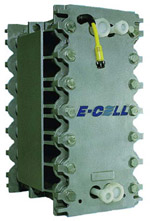March 4, 1999Management
Asahi Glass Enters Market for Ultrapure Water Production Equipment
TOKYO-Asahi Glass Co., Ltd., today announced the launch of an electrodeionization (EDI) technology-based ultrapure water production unit in Japan and other Asian countries, marking the Company's entry into this new market.
Applications for ultrapure water vary widely and include semiconductors, power-plant, pharmaceuticals, high-purity chemical processing and food processing. Two methods currently exist for ultrapure water production, one using an ion-exchange resin tower and the other EDI.
Asahi Glass has collaborated with E-Cell Corporation (ECC) in Canada to develop EDI technology. The two companies have focused on maximizing Asahi Glass' ion exchange membrane and electrodialysis technologies and ECC's systematization and mass production capabilities. These efforts culminated in the development of E-CELL, a highly cost-effective EDI unit, in late 1996. ECC began marketing E-CELL, primarily in North America, Europe and some of Asian countries in 1997. Asahi Glass completed technological development for the domestic market before launching E-CELL in Japan and other Asian countries last month.
E-CELL offers several key advantages over conventional resin towers. The unit
-
places less of a burden on the environment because it discharges no waste water by regeneration (resin tower systems discharge waste water during chemical treatment of the resin)
-
takes up only one-third to one-quarter of the space required by an resin tower system, meaning it can be installed in small spaces
-
offers significantly lower production costs per unit of ultrapure water than conventional units
-
guarantees equal or greater resistivity* for water produced
The production of ultrapure water necessitates the removal of impurities, such as salt and organic matter, from feed water. Ion-exchange resin packed in the diluting compartment of the E-CELL unit continuously absorbs ionized impurities. The potential difference inside the electrodialyzer removes absorbed ionized impurities to the concentrating compartment. This process also enables E-CELL to regenerate ion-exchange resin constantly without requiring treatment of the resin with hazardous caustic or acidic substances. Unlike conventional ion-resin towers, therefore, the E-CELL unit does not generates waste water containing hazardous chemicals following resin generation.
Ion-resin towers require multiple process lines. With E-CELL, all processes are integrated within the unit to save space and installation costs. E-CELL units are thus compact enough to be installed in places that cannot accommodate resin towers.
Demand for EDI ultrapure water production systems has grown significantly in recent years, reflecting increasing concern for our environment. The global market for these systems is currently estimated at ¥ 20 billion, while the market in Asia, including Japan, is estimated at ¥ 5 billion. Growth has also been supported by replacement purchases of E-CELL by former owners of resin tower system.
Asahi Glass and ECC have delineated sales boundaries and will continue to promote sales of EDI systems in their respective markets. Asahi Glass will sell stacks (individual units) and EDI systems to local water treatment engineering companies its market-i.e., Japan and the rest of Asia-and anticipates sales in will reach ¥ 400 million in the fiscal year ending March 31, 2000 and ¥ 1.5 billion in the fiscal year ending March 31, 2002.
Additional Information
(1) Models available:
| E-CELL MK-1E | Standard water production capacity:2.8 m3/hour Resistivity of water produced: higher than 16 ?cm External dimensions: 30 cm(H) x 43 cm(W) x 61 cm(D) |
| E-CELL MK-1 Mini | Standard water production capacity: 1.0 m3/hour Resistivity of water produced: higher than 16 ?cm External dimensions: 30 cm (H) x 24 cm (W) x 61 cm (D) |
Note: Resistivity indicates water purity. A high resistivity level indicates a high level of purity. The theoretical resistivity of pure water is 18.2 ?cm. The required water purity level varies depending on the application: over 4 ?cm for small boilers, over 10 ?cm for large scale power plants and over 15 ?cm for nuclear power plants. Water purity above 15 ?cm is generally called "ultra pure water".
E-CELL System
The E-CELL System integrates the pipes, tank, rectifier, control panel, etc., required for stack operation, making it possible to obtain ultrapure water simply by feeding pre-treated water into the system. The standard-specification E-CELL System is suitable for applications requiring production capacities from 1.0m3/hour to 66.0 m3/hour. Capacity is increased by adjusting the number of E-CELL stacks on the rack.
 |
|
(2) E-Cell Corporation
| Head office: | Ontario, Canada |
| President: | Mr. Mark Huehnegerd |
| Operations: | Manufacture and sales of EDI systems |
- For further information, please contact
- Mr. Ichiro Takaku
Director, Membrane business
Chemical Engineering Division
Asahi Glass Co., Ltd. - TEL: 81-3-3636-9252

